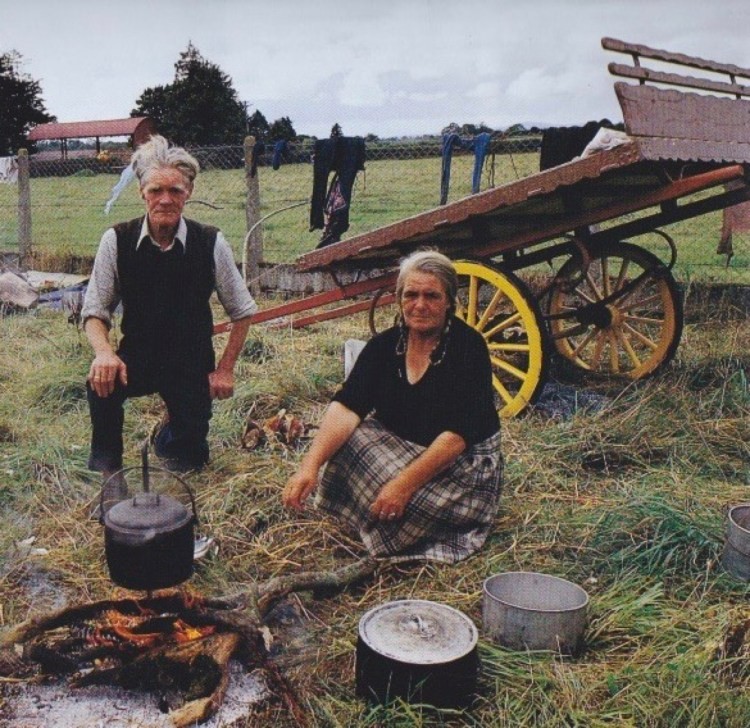James Barrett on Nostr: The Travelling People "When I was a child we were hunted from place to place and we ...
The Travelling People
"When I was a child we were hunted from place to place and we could never have friends to be always going to school with. The little settled children would run past our camps – they were afeard of the travellers. Other people had a sort of romantic idea about us, because of the horses and the colourful wagons. They would ask us did we come from some place special like the gypsies you see on the films. They thought that the travellers had no worries and that we didn’t feel pain or hunger or cold. The truth is that we’re people like everybody else but we’re a different speaking people with our own traditions and our own way of life and this is the way we should be treated, not like dirt…” ––from ‘Traveller’, an autobiography by Nan Joyce.
Travellers are often referred to by the terms tinkers, gipsies/gypsies, itinerants, or, pejoratively, knackers in Ireland. Some of these terms refer to services that were traditionally provided by the group — tinkering or tinsmithing, for example, being the mending of tinware such as pots and pans, and knackering being the acquisition of dead or old horses for slaughter. The term gypsy first appeared in record in the 16th Century referring to the continental Romani people in England and Scotland who were mistakenly thought to be Egyptian. Other derogatory names for itinerant groups have been used to refer to Travellers including the word pikey.
The historical origins of Irish Travellers as a group has been a subject of academic and popular debate. Research is complicated by the fact that the group has no written records of their own. They may be of Romani extraction, although this theory is disputed and theories of pre-Celt origin also exist. Jean-Pierre Liégeois wrote that the Irish Traveller Gammon vocabulary is derived from pre-13th-century Celtic idioms with ten percent Indian origin Romani language vocabulary. Celtic language expert Kuno Meyer and Romani language linguist John Sampson both asserted that Shelta existed as far back as the 13th century, 300 years before the first Romani populations arrived on the island of Britain.

"When I was a child we were hunted from place to place and we could never have friends to be always going to school with. The little settled children would run past our camps – they were afeard of the travellers. Other people had a sort of romantic idea about us, because of the horses and the colourful wagons. They would ask us did we come from some place special like the gypsies you see on the films. They thought that the travellers had no worries and that we didn’t feel pain or hunger or cold. The truth is that we’re people like everybody else but we’re a different speaking people with our own traditions and our own way of life and this is the way we should be treated, not like dirt…” ––from ‘Traveller’, an autobiography by Nan Joyce.
Travellers are often referred to by the terms tinkers, gipsies/gypsies, itinerants, or, pejoratively, knackers in Ireland. Some of these terms refer to services that were traditionally provided by the group — tinkering or tinsmithing, for example, being the mending of tinware such as pots and pans, and knackering being the acquisition of dead or old horses for slaughter. The term gypsy first appeared in record in the 16th Century referring to the continental Romani people in England and Scotland who were mistakenly thought to be Egyptian. Other derogatory names for itinerant groups have been used to refer to Travellers including the word pikey.
The historical origins of Irish Travellers as a group has been a subject of academic and popular debate. Research is complicated by the fact that the group has no written records of their own. They may be of Romani extraction, although this theory is disputed and theories of pre-Celt origin also exist. Jean-Pierre Liégeois wrote that the Irish Traveller Gammon vocabulary is derived from pre-13th-century Celtic idioms with ten percent Indian origin Romani language vocabulary. Celtic language expert Kuno Meyer and Romani language linguist John Sampson both asserted that Shelta existed as far back as the 13th century, 300 years before the first Romani populations arrived on the island of Britain.
